|
The
Tuesday's issue of the Frankfurt Imperial Postoffice
Newspaper "Dienstaegige Frankfurter Kaiserl.
Reichs=Ober=Post=Amts=Zeitung" from
May 21, 1793, Number 81 published the following story:
It reads
as follows:
"Frankfurt,
May 20. Today we received
the following report:
When
Prince of Hohenlohe observed at Blies close to Ottweiler on May
15, 1793, that the enemy post close to
Neuenkirchen had reinforced its troops to 2000 soldiers,
he realized that the unfavorable positioning of the
troops in the fields would still make an attack possible
without difficulties. He then did order the 900
soldier strong detachment of colonel von Ezekely to fire onto the enemy with their guns. The Frenchmen
answered the fire vividly, but without any effect. The
Prince simultaneously ordered an attack using the close
by stationed riflemen of a battalion from Trier and the
trooper of the fusilier battalion von Wedel. This attack
made the French corps realize that its flanks were in
danger and started a rather unorganized retreat. Our cavalry
pressed them towards Spiessen and caused much damage to
the French. 1 captain, 3 officers and 51
enlisted soldiers were captured by the action of the brave Lieutenant
von Klüx of the von Wedel trooper battalion, who fought
leading ahead of the riflemen. The French left 19 dead
behind. Our casualties were limited to one Hussar and 2
horses."
Based on
such a brave act General Lieutenant
Baron Franz Carl Friedrich Ernst von Klüx received shortly
afterwards the following document:
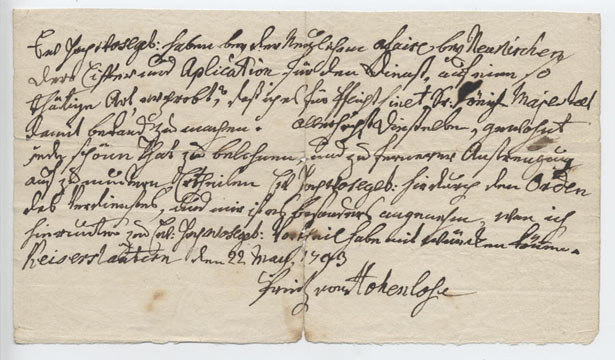
It reads
as follows:
Euer Hochwohlgeb:
haben bey der neylichen afaire bey Neukirchen dero
Eiffer und Aplication für den Dienst auf eine so
Thätige Art erprobt, daß ich es für Pflicht find Sr.
Königl. Majestat damit bekand zu machen.
Allerhöchst Dieselben, gewohnt jede schöne That zu
belohnen, und zu fernerer Anstrengung auf zu muntern
Ertheilen Euer Hochwohlgeb: hierdurch den Orden des
Verdienstes, und mir ist es besonders angenehm, schon
ich hierunter zu Euer Hochwohlgeb: Vortheil habe mich
schmücken können.
Keiserslautern den
22. May, 1793
Prinz
von Hohenlohe
It reads
like this in English: "You have proven your
eagerness and involvement in the service at such a level
during the affair at Neuenkirchen that it was my duty to
make his highness familiar with it. It is most pleasant
for me to reward you for this deed with the Merit Order
in order for you to excel your efforts."
The
prince of Hohenlohe had indeed awarded him on
March 22, 1793 the at that point of time called "Order of Merit":
The
following picture shows this decoration. The crown was
naturally not awarded immediately with the Merit Order,
but 50 years later when von Klüx celebrated his 50th
orders jubilee (July 18, 1844).
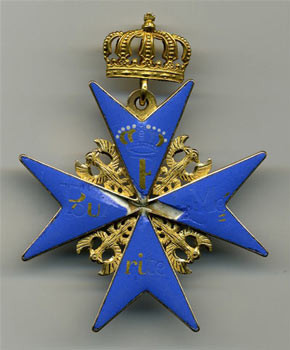 |
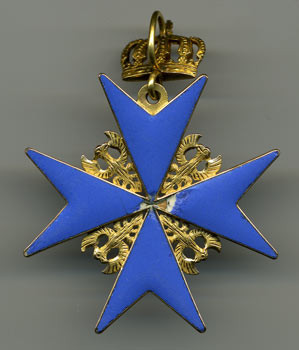 |
|
avers
|
revers
|
The
cross itself complies with the workmanship of the time.
As little gold as possible found its way into this
decoration. The gold functions actually as a form that
contains multiple layers of enamel from a white base
layer up to the final Prussian blue colored enamel
containing the golden letters forming the orders motto:" Pour
le Mérite" as well as the crown. Both are made
from gold leaf.
The
" Pour
le Mérite" marked von Klüx's career's beginning. The following
contemporary pictures shows him with an impressive rooster
of medals and decorations. Besides the Iron Crosses of the
2nd and 1st class one can see a Red Eagle Order 3rd class
as well as several Russian decorations.
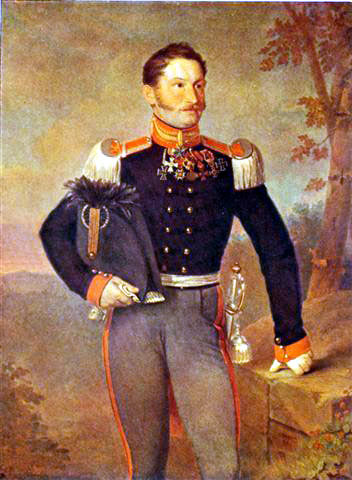
von
Klüx as Colonel wearing his impressive set of order
decorations
Requests
for being awarded the Order of the Iron Cross for the
Napoleonic War from 1813-1815 were still placed with the
General Order Commission until 1841 and beyond. This and
some in dept research showed, that many knights of the
Iron Cross lived in poor conditions. The later was
reinforced by numerous requests for support directly
posted to the king.
Based
on those circumstances and to uphold the status of the
Iron Cross, the king initiated in May 1841 the creation of
a “Senioren-Stiftung” (Senior-Fund) that would enable
recipients of the Iron Cross to enjoy a pension of sorts
in analogy to orders awarded in other European states.
Initial
problems with funding through the state were brushed aside
and the direct request was posed to wrap this matter up
the August 3, 1841, the birthday of King Friedrich Wilhelm
IV’s father.
Benefactors
of this grand were limited to 24 seniors of the Iron Cross
first class and 72 seniors of the second class. Those were
in compliance with the following rules:
§
1. Only Knight’s wearing the order on the black and
white ribbon for combatants
§
2. Residing within the Prussian territory
§
3. Only 24 first class and 72 second class slots were
available
§
4. The army rank the Iron Cross was awarded in was valid
for the selection
§
5. Entrance into the Senior position was also ruled by
the sequence of events during the Napoleonic War (it was
later added that wounded in combat, then seniority in
the army, then age would be applied if the Iron Cross
was fall in the same timely sequence of events)
§
6. Inherited Iron Crosses followed the same rules above
§
7. Granting the Senior position was done only by the
King himself on August 3 of each following year
§
8. Everybody that is able due to private wealth or
income will be granted the title Honorable-Senior (Ehren-Senior)
of the Iron Cross
In
December 1856 only 13 Iron Cross first class and 108
second class recipients were still in the Army, 1859 the
number shrunk to 12 of the first class and 89 second. The
count diminished from just 10 years earlier from 40 first
class recipients and 349 of the second class.
All
in all the following statistic applies for all living Iron
Cross recipients:
Iron
Cross 1st Class – 96
Iron
Cross 2nd Class – 3530
For
the 50 year anniversary on March 17, 1863, all still
living Iron Cross bearers were entitled to receive the
senior pension pay, except those that would qualify to be
an honorable senior based on paragraph 8.
The
last change was made on January 1, 1863, were all bearers
of the Iron Cross, no matter of nationality were granted
the increased senior pension of 50 or 150 Thaler for their
lifetime. Those were 73 of the first class and 3042 of the
second. Those include those Iron Crosses that were passed
on by the inheritance rules up to 1839.
It
turns out that von Klüx was amongst those that qualified.
Talks with the descendents of his family revealed that he
had asked for financial help from his king several times.
Yet, he still passed on the opportunity of receiving a
pension and was therefore made an honorable senior of the
Iron Cross.
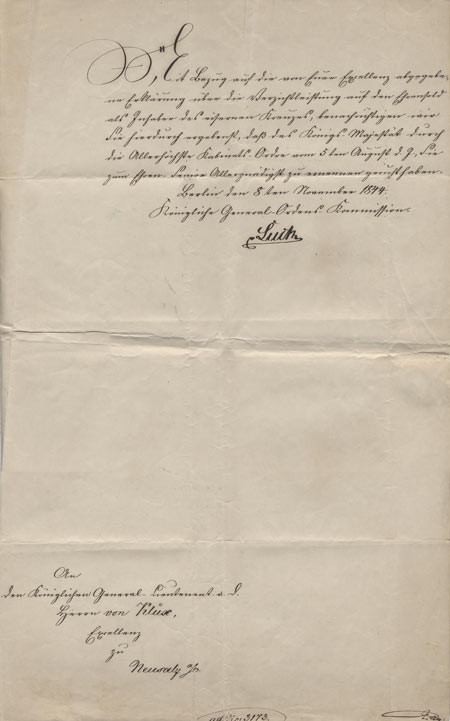
The
extremly rare document for bestowal of the honorable
senior of the Iron Cross
All
in all we have not just a very brave man, but also
somebody doing the right thing for his fatherland.
©
Andreas M. Schulze Ising V/2010
|